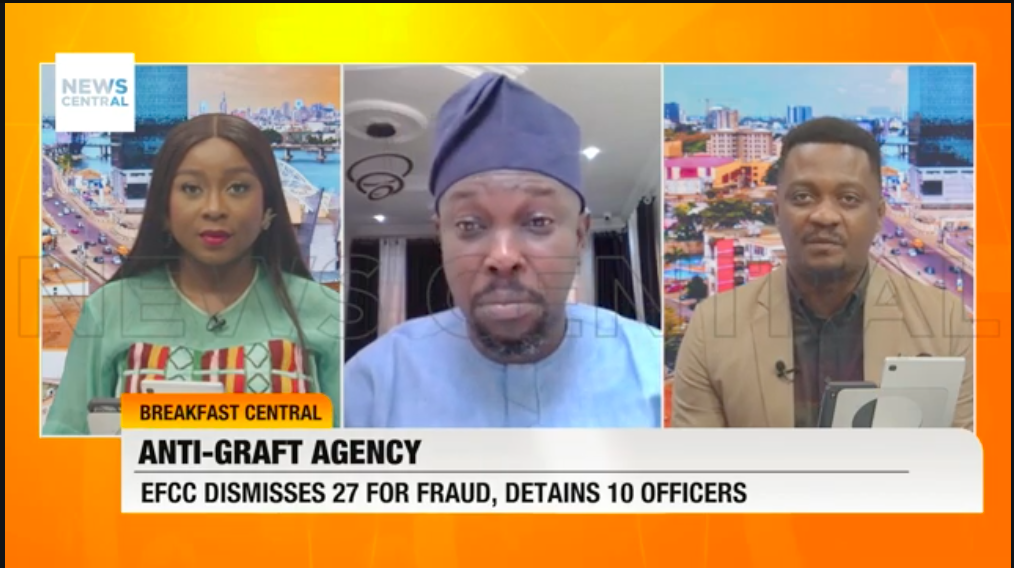Ten personnel from the Nigerian Economic and Financial Crimes Commission’s (EFCC) Lagos zonal headquarters were recently arrested on suspicion of stealing operational supplies.
The EFCC Chairman Abdulrasheed Bawa is taking this action as part of a larger plan to eradicate corruption inside the organisation.
Additionally, 27 employees were fired for misconduct involving fraudulent acts, according to the EFCC spokesperson.
In addition to restoring public confidence, this internal purification will show the agency’s dedication to fighting corruption. There have been discussions on the effectiveness and legitimacy of the EFCC, especially about the requirement for accountability within law enforcement authorities and the openness of disciplinary actions.
Legal practitioner Deji Ajare stated on Friday’s Breakfast Central on New Central TV that everything that benefits the goose should also benefit the gander.
He believed that the EFCC would not publicly deny its earlier claim if it arrested regular Nigerians and used the media to show their names, faces, and even serious accusations of corruption, for example, and if the individuals were later released and found not guilty after a trial.
“You ought to be able to hold your officials to the same level. The police force experiences the same thing occasionally; you frequently hear about the dismissal of thirty-three police officers. We want names mentioned, but sometimes—and perhaps more importantly—because they are law enforcement agencies, it’s also necessary to occasionally inform the public that, in addition to naming and shaming, these individuals have undergone this process, been found not guilty by internal mechanisms, and received this punishment.
“Although we applaud the EFCC for taking this action, it should go further than what it has done thus far by revealing the names and pictures. This could even help the EFCC itself avoid situations where its former officials will go and continue to impersonate officials and use that opportunity to deceive innocent Nigerians.
“It reinforced the people’s confidence; these things mustn’t be things that the agencies should have the option of doing or not doing.”
He suggested that the public’s increasing need for accountability is reflected in the demand for the identities and photos of the detained officers. The EFCC might restore confidence and discourage further wrongdoing by implementing a transparent approach.

The discussion also brings to light persistent issues with Nigeria’s multiple standards in the application of the law, particularly about the way the legal system treats the wealthy and the poor.
Restoring public trust requires the EFCC to address internal corruption, which is demonstrated by the detention of its officers. The EFCC may be more successful in battling widespread corruption in society if it addresses unethical behaviour from the inside and delivers a clear message that no one is beyond accountability.
The EFCC’s significant dedication to moral behaviour is demonstrated by the dismissal of 27 employees. As the agency strives to set an example, this step strengthens its credibility and solidifies its position in the battle against corruption. But to keep this credibility, constant inspection and public demands for openness are still necessary.
“The EFCC’s arrest of the operatives is a praiseworthy step in the battle against corruption; it shows that the EFCC is prepared to address issues of unethical behaviour that have been rampant against EFCC officers in the past.
“You can see how corruption and unethical behaviour, such as that which is allegedly present in law enforcement agencies, erode public confidence and reduce the efficacy of government anti-corruption efforts.
“As a major anti-corruption organisation in Nigeria, the EFCC has essentially strengthened its credibility by stating that charity starts at home.
“Such measures, in my opinion, are necessary to stop impunity, and without putting mechanisms in place to stop it, the organisation itself cannot function effectively because it will undoubtedly result in compromises of very important cases. Of course, you will agree with me that over the years, there have been several very important cases that seemed to be straightforward cases at first, but before you know what’s happening, you find a funny scenario playing up, and you start to wonder if these people are being serious or if they are just playing us.”
The discussion around the EFCC’s conduct brings up important questions regarding legal equality. A larger worry about Nigeria’s dual justice system, where socioeconomic class frequently affects court decisions, is reflected in the public’s need for transparency. For the integrity of the legal system as a whole, these inequities must be addressed.
Ajare underlined that although the EFCC’s recent initiatives are praiseworthy, they need to be a part of a long-term, all-encompassing plan to fight corruption. Establishing internal systems to regularly check behaviour and hold officials responsible for any wrongdoing is part of this.
Looking ahead, the lawyer stated that by 2025, he hoped the EFCC would be taking firm action against corruption and impunity. To successfully address the underlying causes of corruption and human rights violations in Nigeria, structural changes are necessary, as this long-term perspective emphasises.
The conversations underscore the significance of public engagement in promoting a cooperative strategy to counter corruption. The EFCC may increase its credibility and efficacy as a law enforcement organisation by actively engaging the public in the process and being open about the steps it takes to combat corrupt activities.
While the EFCC’s recent efforts to combat corruption within its ranks are a significant step in rebuilding public trust, the organisation must ultimately continue to place a high priority on accountability and openness. The wider ramifications of these actions reveal ingrained problems in Nigeria’s legal system, where cooperation is required to guarantee justice and integrity for all residents.


